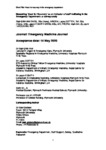Measuring ‘Need for Recovery’ as an indicator of staff well-being in the emergency department: a survey study
| dc.contributor.author | Graham, B | |
| dc.contributor.author | Cottey, L | |
| dc.contributor.author | Zhu, Chengyong | |
| dc.contributor.author | Mills, M | |
| dc.contributor.author | Latour, Jos M | |
| dc.date.accessioned | 2020-07-16T09:09:48Z | |
| dc.date.available | 2020-07-16T09:09:48Z | |
| dc.date.issued | 2020-07-09 | |
| dc.identifier.issn | 1472-0205 | |
| dc.identifier.issn | 1472-0213 | |
| dc.identifier.uri | http://hdl.handle.net/10026.1/16048 | |
| dc.description | No embargo required. | |
| dc.description.abstract |
<jats:sec><jats:title>Background</jats:title><jats:p>The Need for Recovery (NFR) Scale is an 11-item questionnaire that assesses how work affects intershift recovery. Items are summated to form a score with a maximum value of 100. Previously reported scores range from 38 in nurses to 55 in miners. This study aimed to determine the NFR Score among ED staff and to identify whether the NFR Score was associated with characteristics potentially implicated with recovery from work.</jats:p></jats:sec><jats:sec><jats:title>Methods</jats:title><jats:p>Staff in a single ED in the South West of England (annual attendances of 93 000) were asked to complete an electronic questionnaire incorporating the NFR Scale plus additional items relating to demographic, work-related and well-being characteristics, in their own time during January 2018. Descriptive statistics are presented, including median NFR Scores and associations with additional characteristics. Thematic analysis of free-text comments from an open-ended question was undertaken.</jats:p></jats:sec><jats:sec><jats:title>Results</jats:title><jats:p>One hundred and sixty-eight responses were obtained (80.3% capture). Median NFR Score across all staff groups was 81.8 out of 100.0 (95% CI 72.7 to 81.8). Shift duration exceeding 12 hours, dissatisfaction with work–life balance and self-reported perceptions of burnout were associated with significantly elevated NFR Scores. Themes resulting from the open-ended question were ‘barriers to intershift recovery’ and ‘coping with work’.</jats:p></jats:sec><jats:sec><jats:title>Conclusion</jats:title><jats:p>The NFR Scores in this study exceeded scores reported elsewhere and were associated with some demographic, occupational and well-being characteristics. The NFR Scale has utility to measure the need for intershift recovery among ED staff. A larger study is warranted to identify specific determinants of recovery and to provide recommendations.</jats:p></jats:sec> | |
| dc.format.extent | 555-561 | |
| dc.format.medium | Print-Electronic | |
| dc.language | en | |
| dc.language.iso | en | |
| dc.publisher | BMJ | |
| dc.subject | emergency department | |
| dc.subject | qualitative research | |
| dc.subject | safety | |
| dc.subject | staff support | |
| dc.subject | Adaptation, Psychological | |
| dc.subject | Adult | |
| dc.subject | Burnout, Professional | |
| dc.subject | Emergency Service, Hospital | |
| dc.subject | England | |
| dc.subject | Female | |
| dc.subject | Humans | |
| dc.subject | Job Satisfaction | |
| dc.subject | Male | |
| dc.subject | Occupational Health | |
| dc.subject | Surveys and Questionnaires | |
| dc.subject | Work Schedule Tolerance | |
| dc.subject | Work-Life Balance | |
| dc.subject | Workload | |
| dc.title | Measuring ‘Need for Recovery’ as an indicator of staff well-being in the emergency department: a survey study | |
| dc.type | journal-article | |
| dc.type | Journal Article | |
| plymouth.author-url | https://www.webofscience.com/api/gateway?GWVersion=2&SrcApp=PARTNER_APP&SrcAuth=LinksAMR&KeyUT=WOS:000601011900006&DestLinkType=FullRecord&DestApp=ALL_WOS&UsrCustomerID=11bb513d99f797142bcfeffcc58ea008 | |
| plymouth.issue | 9 | |
| plymouth.volume | 37 | |
| plymouth.publication-status | Published | |
| plymouth.journal | Emergency Medicine Journal | |
| dc.identifier.doi | 10.1136/emermed-2019-208797 | |
| plymouth.organisational-group | /Plymouth | |
| plymouth.organisational-group | /Plymouth/Faculty of Health | |
| plymouth.organisational-group | /Plymouth/Faculty of Health/School of Nursing and Midwifery | |
| plymouth.organisational-group | /Plymouth/REF 2021 Researchers by UoA | |
| plymouth.organisational-group | /Plymouth/REF 2021 Researchers by UoA/UoA03 Allied Health Professions, Dentistry, Nursing and Pharmacy | |
| plymouth.organisational-group | /Plymouth/Research Groups | |
| plymouth.organisational-group | /Plymouth/Research Groups/Institute of Health and Community | |
| plymouth.organisational-group | /Plymouth/Research Groups/Plymouth Institute of Health and Care Research (PIHR) | |
| plymouth.organisational-group | /Plymouth/Users by role | |
| plymouth.organisational-group | /Plymouth/Users by role/Academics | |
| dc.publisher.place | England | |
| dcterms.dateAccepted | 2020-05-14 | |
| dc.rights.embargodate | 2020-7-18 | |
| dc.identifier.eissn | 1472-0213 | |
| dc.rights.embargoperiod | Not known | |
| rioxxterms.versionofrecord | 10.1136/emermed-2019-208797 | |
| rioxxterms.licenseref.uri | http://www.rioxx.net/licenses/all-rights-reserved | |
| rioxxterms.licenseref.startdate | 2020-07-09 | |
| rioxxterms.type | Journal Article/Review |


